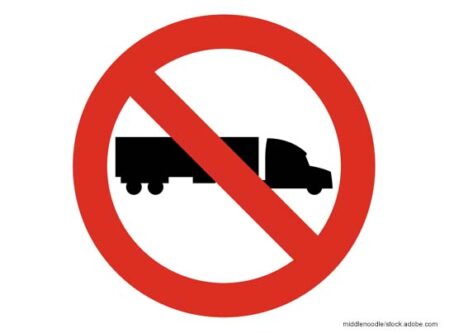Ticket camera rules approved, advance in 11 statehouses
One prolific transportation safety-related topic covered at statehouses on an annual basis is the use of ticket cameras.
Federal guidance from early 2022 authorizing states to tap billions for roadway safety programs has resulted in state lawmakers across the country adopting and pursuing legislation covering automated cameras.
The technology has been touted by the U.S. Department of Transportation as one tool to aid in reducing traffic fatalities.
The agency states that “automated speed enforcement, if deployed equitably and applied appropriately to roads with the greatest risk of harm due to speeding, can provide significant safety benefits and save lives.”
Ticket camera use addressed in 11 statehouses
Red-light and/or speed cameras to nab drivers who disobey traffic rules are used in more than 500 communities across the nation, the Insurance Institute of Highway Safety reports.
Officials with the Owner-Operator Independent Drivers Association say the focus on the revenue-generating devices ignores the more logical and reasoned approach to roads and traffic: keep traffic moving in as safe a manner as possible.
Arkansas
A new Arkansas law authorizes the use of traffic cameras to enforce speed limits in certain areas.
Gov. Sarah Huckabee Sanders has signed into law a bill permitting the use of speed cameras in work zones. Workers must be present in the area for cameras to be used for enforcement.
Law enforcement is required to be stationed at the end of highway or interstate work zones. An officer would have authority to issue a warning or a citation.
A signage requirement alerting travelers to the presence of speed cameras is included.
Previously SB481, the new law takes effect Aug. 1.
California
A bill moving through the California statehouse would expand the state’s authority to use automated ticket cameras.
The Golden State already authorizes the use of red-light cameras. The ticketing tool is used in more than 30 areas around the state. Speed cameras, however, are prohibited.
The Senate Transportation Committee has voted to advance an amended bill authorizing a five-year pilot program to utilize speed enforcement cameras in areas identified to have high crash rates. Assembly lawmakers previously approved the bill.
AB645 would apply to the cities of Glendale, Los Angeles, Long Beach, Oakland, San Francisco and San Jose.
Warnings would be issued to violators for the first 60 days. After that, fines for exceeding the posted speed by at least 11 mph would range from $50 to $500.
One change made to the bill in committee would allow first-time violators traveling 11 to 15 mph over the posted speed to also receive warnings.
Ticket revenue would be used to administer the program and pay for “traffic calming measures.”
Supporters say use of the enforcement tool makes travel safer. They add that it reduces police interactions with drivers while maintaining driver accountability.
Opponents include the Western States Trucking Association. The group previously told lawmakers AB645 is “excessively overbroad” for a pilot program.
“It authorizes an undefined number of speed cameras to enforce any speed law, either through a fixed or mobile radar or laser system or any other electronic device, within six California cities.
The bill awaits further consideration in the Senate. If approved there, AB645 would head back to the Assembly for approval of changes.
Colorado
A new Colorado law allows for more speed ticket cameras.
State law has restricted the use of speed cameras to areas that include construction zones. An officer has been required to be present when a speed camera is in use.
Notice of a violation was required to be issued and sent to the vehicle owner within 90 days of the violation.
Gov. Jared Polis has signed into law a bill allowing municipalities to designate corridors where speed cameras may be installed. Signage requirements are included.
SB200 also does away with the requirement that an officer be on site.
First-time offenders would receive a warning as long as they are driving less than 10 mph above the posted speed limit. Fines are capped at $40.
The new rule took effect immediately.
Connecticut
Connecticut Gov. Ned Lamont has signed into law a bill to greenlight more access to automated ticket camera enforcement.
State law previously authorized the use of speed cameras in work zones. Statute has not covered red-light cameras.
Previously HB5917, the new law contains a provision to permit municipalities to utilize red-light cameras and speed cameras in areas that include “pedestrian safety zones” and at sites within a municipality “that had a history of traffic crashes caused by excessive speed or by violations of a traffic sign or traffic signal.”
Municipalities are required to adopt an ordinance authorizing cameras. The Connecticut Department of Transportation also must approve any ticket programs.
First-time violators would be fined up to $50. Violations would be limited to exceeding the posted speed by at least 10 mph or running a red light.
Programs in participating municipalities would need to get extensions approved by the state DOT every three years.
Delaware
In Delaware, Gov. John Carney has signed into law a bill that includes a provision to authorize speed cameras in certain areas.
HB94 creates a five-year pilot program to permit speed cameras in work zones.
There is no warning period included in the new law. Citation notifications would be doled out to owners of vehicles found exceeding the posted speed by at least 11 mph.
Advocates say the enforcement tool is needed to help counter shortages of police officers.
“Electronic enforcement of our traffic laws have been helpful in reducing accidents while allowing police to focus on other public safety concerns,” stated Rep. Ed Osienski, D-Newark.
The new law took effect immediately.
Illinois
One bill on the Illinois governor’s desk is intended to rein in corruption tied to automated enforcement.
There are 68 locales around the states that use red-light cameras, the Insurance Institute for Highway Safety reports. The city of Chicago has red-light cameras and speed cameras. Additionally, speed cameras are permitted in work zones.
State lawmakers this year approved a bill to establish “ethical guidelines” to address ongoing concerns about the cameras’ use.
Specifically, HB3903 would prohibit campaign contributions from contractors who provide automated traffic enforcement equipment to any political action committee created by a contractor and any affiliates.
“We have seen numerous bad actors throughout local and state government,” Sen. Bill Cunningham, D-Chicago, stated in a news release. “This legislation will put roadblocks in place to ensure that bad actors are punished for their crimes.”
Additionally, a county or municipality would be forbidden to change the yellow light interval at an intersection up to six months before automated cameras are posted at the affected intersection.
One more provision would authorize the Illinois DOT to revoke any permit for red-light cameras if any official or employee who serves that county or municipality is charged with bribery, official misconduct, or a similar crime related to the use of ticket cameras.
Indiana
A new Indiana law authorizes the Indiana State Police to set up ticket cameras in highway work zones to enforce speed limits. The new authority took effect July 1.
State law authorizes fines between $300 and $1,000 for speeding in work zones. Statute has not allowed nor prohibited the use of speed cameras.
The new law allows drivers to be punished for exceeding the posted speed in work zones by at least 11 mph. Devices can be in use when workers are present.
Offending vehicle owners would receive a warning for a first offense. Repeat offenders would face $75 fines. Subsequent offenses would result in $150 fines.
A fiscal impact statement shows an average of 1,675 guilty verdicts in Indiana were entered for speeding in a work zone annually over the past seven years.
Michigan
Two bills halfway through the Michigan statehouse would authorize automated speed enforcement in work zones.
Currently, no communities in the state employ the use of red-light cameras and speed cameras.
House lawmakers voted to advance two bills that would permit speed cameras to enforce vehicle speeds in work zones on a highway or street.
HB4132 and HB4133 would give the Michigan State Police and the Michigan DOT permission to utilize automated enforcement.
Devices would be authorized for use when construction workers are present. Owners of vehicles found traveling at least 10 mph above the posted speed limit would receive violation notices in the mail.
First-time offenders would receive a written warning in the mail. Repeat offenders with violations within three years would face fines up to $150. Subsequent offenses within the same time frame would result in fines up to $300.
A sign must be posted before entering the work zone to notify drivers about the automated enforcement.
Additionally, a work zone safety fund would be created with the state DOT coordinating with state police and local law enforcement to increase police presence within work zones, to fund devices, and to make other safety enhancements.
Both bills have moved to the Senate Transportation, Mobility and Infrastructure Committee.
Oregon
A new Oregon law expands the use of photo radar in the state.
Oregon has 10 cities, including Portland, where photo radar is permitted on segments of roads. Tickets are issued for violators exceeding the posted speed by more than 10 mph.
Speed radar in affected locales is limited to use for up to four hours per day.
The new law authorizes all cities to use photo radar. Additionally, a restriction on the number of hours per day that photo radar may be used in any one location is eliminated.
Cities also have authority to change and determine speed on different segments of roads up to 10 mph below the statutory speed, providing the designated speed is not less than 20 mph.
The rule changes take effect Jan. 1.
Pennsylvania
Two Pennsylvania bills covering speed cameras are on the move at the statehouse.
House lawmakers voted to advance a bill that would renew and expand automated enforcement in the city of Philadelphia.
Since June 2020, speed cameras are posted along U.S. 1, or Roosevelt Boulevard, in Philadelphia. The program has a December sunset date.
Travelers receive tickets for exceeding the posted speed by at least 11 mph along the boulevard.
House Transportation Committee Chairman Ed Neilson, D-Philadelphia, is behind the bill to eliminate the expiration date.
HB1284 would also expand the use of speed cameras to any Philadelphia roads. The lone requirement for adding speed cameras would be approval by city ordinance and PennDOT.
Neilson touts the success of the programs to reduce traffic incidents.
“The numbers show that these programs work to stop reckless driving and save lives,” Neilson previously stated. “We must eliminate these expiration dates to preserve the safety of Pennsylvanians while on our roads and highways.”
A provision to extend authorization of speed cameras in active work zones around the state was removed in committee. The program has a December sunset date.
The amended bill awaits further consideration in the Senate Transportation Committee.
The Senate Transportation Committee has approved a related bill to make the Roosevelt Boulevard and the work zone programs permanent.
Additionally, speed cameras would be permitted along the Pennsylvania Turnpike.
SB748 has moved to the Senate Appropriations Committee.
Washington
In Washington, a new state law expands the use of the speed-ticket cameras.
Currently, speed cameras are permitted by state law and by city ordinance. Locations are limited to school, public park and hospital zones. Other locations of concern can also be outfitted with ticket cameras.
The new law authorizes the ticketing mechanism in highway work zones. Citations could only be issued when workers are present.
Additionally, signs must be posted to alert travelers to the presence of cameras. Notices of violation must be sent within 30 days.
Data from the Washington State DOT show there were 283 minor injury crashes, 28 serious injury crashes and five fatal crashes in work zones in 2021.
The Washington State DOT requested the new rule that takes effect in July 2024. LL









